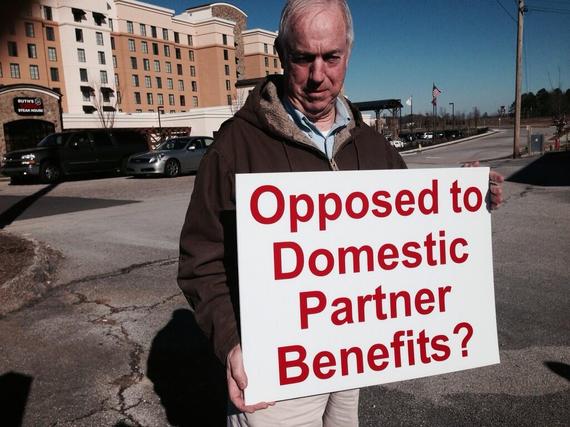Three Tennessee towns now recognize same-sex couples. In a landmark decision for the so-called "buckle" of the Bible Belt, Chattanooga joined Knoxville and Collegedale with a City Council vote recognizing same-sex spouses of City employees for benefits.
The decision, which narrowly passed in both Collegedale and Chattanooga, has left members of local churches and the tea party outraged.
Thousands of residents of the Volunteer State, people who are primarily of British, Irish and Scottish descent and whose faith takes precedence, believe decisions recognizing same-sex couples should be made by them, the taxpayers, in a referendum, not by city councils.
Mark West of the tea party in east Tennessee says that this is about "giving the public the right to decide on issues that affect them and their society."
On the opposite end of the spectrum, Tennessee Democrat and Chattanooga City Councilman Chris Anderson has heralded the progress made as "historical."
The divisive nature of recognition of same-sex couples in Tennessee has made headlines as far away as Los Angeles and across the South. The issue has already proved controversial in the UK, with hate campaigns and smear groups in Scotland and England.
Mark West says he is now only a thousand signatures away from the required threshold of 4,500 to bring the previous approval to a referendum. He will submit the signatures early this month.
For Chattanooga, Collegedale and Knoxville, a changing world and a changing time have come to their doorstep.
With only 15 states in America granting full marriage rights to same-sex couples, the struggle between faith and change has left many outraged, confused and protesting.
Petitioners from the tea party spent "Black Friday" weekend canvassing against the recognition of same-sex couples.
Some elected officials see a "gay lifestyle" as dangerous and coming with "health risks," according to Chattanooga City Council's Larry Grohn. This viewpoint is alive and well across Tennessee, Georgia and Alabama today.
Yet increasingly, student migration and youth activism are forcing those on the fence to reconsider where their true loyalty lies. Cities such as Asheville, N.C., and Hunstville, Ala., which are seen as "hipster" and "techy" capitals, are paving the way for alternative lifestyles and social reform at a grassroots level.
A greater focus on the environment, recycling and Web- and app-based employment is dominating where steel, iron and mining shone in the last century. Changes similar to this can be seen today in the UK in Sheffield, Leeds, Newcastle and Manchester.
Successful college hubs like Knoxville and Athens, Ga., are seeing more and more graduates remaining in the South because of heavy college loans, a low cost of living and sustained employment in IT, engineering and medicine.
An aging population and the demand for "medium care" medical professionals such as physician assistants and nurse practitioners has paved the way for thousands of graduates to stay in their hometowns. Incentives for these graduates to work in health care in isolated rural areas such as north Georgia have allowed many students to pay off their debt in a matter of years.
The change seen in Tennessee's three urban areas where same-sex couples have made progress is merely a reflection of an underlying change in Southern life.
While drug addiction and domestic violence statistics show the South in an unfavorable light, a gradual change is coming. A mix of different nationalities, religions and societies that may initially divide towns and cities can ultimately make Southern cities stronger.
